General
The 2017/2018 Global Report on “World Freedom of Expression and Media Development”: its relevance to the journalism profession in Uganda
Published
6 years agoon
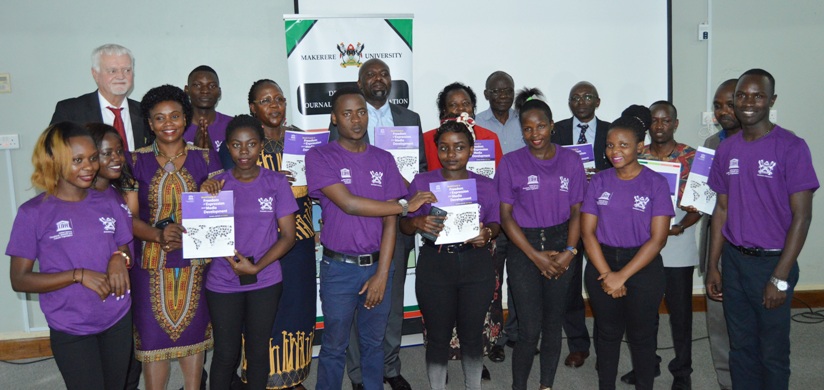
On 14th March 2018, the Commissioner for the Uganda Human Rights Commission, Hon. Meddie B. Mulumba launched the 2017/2018 Global Report on “World Freedom of Expression and Media Development.” This was at a colourful ceremony organised by the Department of Journalism and Communication Makerere University, in partnership with Oslo and Akershus University College of Applied Sciences, Norway.
In 2011 during its 36th General Conference, United Nations Educational Scientific and Cultural Organization (UNESCO) passed a resolution calling for monitoring of the status of press freedom and safety of journalists. The resolution, among other things, emphasized the need to report cases of violence against journalists and similar developments. With support from the Swedish Government, a large scale research project was initiated, leading to the first World Trends in Freedom of Expression and Media Development Report in 2014.Since then, efforts have been renewed to capture contemporary trends in the area of media development and freedom of the press.

The report, which covers the period 2012 to 2017, discusses freedom of expression across four key dimensions of media freedom, pluralism, independence and safety of journalists. It is intended as a tool for implementing the United Nations 2030 Agenda for Sustainable Development, which recognizes the importance of ensuring public access to information and protecting fundamental freedoms among its goals. The report shows that media independence is weakening and the professional standards of journalism are being eroded by economic forces on the one hand and lack of recognition by political actors on the other.
According to Lydia Gachungi from UNESCO Regional Office for Eastern Africa, UNESCO assessed the Global Trends in Freedom of expression and Media Development using the frame of the Windhoek Declaration of Media Freedom, Media Independence, Safety of Journalists, Having a plurality of media choices with a special focus on gender equality in the media. In a presentation, Gachungi said that the report provides a global perspective for those seeking to understand the changing global media landscape.
She stated that the report calls for proactive opportunities to build more capacity of women and develop an online presence that will liberate from newsroom hierarchies, to enhance gender equality online with the aim of addressing the shrinking space. italso advocates and supports progressive cyber security laws that do not hinder freedom of expression and media freedom, Support more MIL/Digital literacy for all and build the capacity of media on issues of access, privacy, safety and security and the ethical use of information, media and technology, in line with human rights standards.

“The report provides room for us to carry out continuous research on continental and global online media landscape, trends and exchange of good practices. It builds the capacity of the media to survive in the digital era, by innovating and generating relevant content, distribute information nationally and across. It also recommends countries to increase coordination, cooperation and knowledge sharing to promote this debate,” she said.
Addressing journalists and representatives from the Ugandan Media, academia, government, civil societies and private sector on the launch of the 2017/2018 Global Report on “World Freedom of Expression and Media Development that was held in the Tele-Conference Hall Makerere University Senate Building, Hon. Meddie B.Mulumbaappreciated the tremendous efforts by UNESCO to put together a report that is not only viewing the critical importance of the evidence-based analysis in developing appropriate actions, but also covering a fundamental human right; ‘freedom of expression’.
According to Hon.Mulumba, the issue of media freedom is a concern of all citizens, not rather just media fraternity or human rights defenders. Freedom of the press and other media and the individuals’ freedom of expression are indivisible and interdependent. The promotion and protection of media freedom enhances the wide freedom of speech and expression of individuals and the public.

“Freedom of expression underpins all other human rights and freedoms. Individuals must be free to exercise their rights to think, form an opinion, freely seek, receive and impart ideas and opinions, in order for them to effectively realise all their other human rights that are prerequisite for their human dignity. the Constitution of Ugandan provides in article 29 that, “every person shall have the right to freedom of speech and expression which shall include freedom of the press and other media,” this right is also provided for in a number of other international and regional human right instruments ratified by Uganda that equally underscore its great significance,” he said.
The Commissioner, also noted that the launch of the report provides another opportunity for stakeholders to be reminded that a lot needs to be done to ensure full respect of the freedom of expression. A soul-searching research is required not only to ensure improvement in observance of all human rights that are at stake but also to prevent retrogression on the aspects on which gains have already been registered. He urged all media practitioners to use the report to recommit themselves to raising the bar of their professionalism by adhering to their professional ethical code and guard against misusing their important role as enablers of the enjoyment of the rights to information in their respective communities.
According to Hon Mulumba, the 2017/2018 Global Report on “World Freedom of Expression and Media Development clearly indicates that there is also increased recognition and enhancement of the rights to access information, the need for training and professionalism and acknowledgement that cyber space requires regulation. In the same spirit, the report indicates that journalists are increasingly playing their role as human rights defenders; and actions to enhance the safety of journalists.
He appreciated the positive development the report cited in the media landscape across the world when he said, “such developments including the legal guarantees for freedom of expression and the media freedom; technology leading to the unprecedented influence on the internet with the emergence of new media having the potential to expand the freedoms, the information sources as well as actors who are currently beyond the journalists are more important.”

He was however, concerned about the disruptive effects of these developments and tasked the human right defenders, enforcers and all stakeholders to monitor them closely.“We should be more concerned about the disadvantages brought about by the diminishing space for journalism in its traditional sense; the abuse and misuse of social media as a source of false or unverified news; the lack of independence from commercial interests; the tendency for some journalists to put profiteering above professionalism and its negative impact on neutrality and objectivity; the metamorphosis of some journalists into government spies; the lack of regard for the special duties and responsibilities that come with media freedom; the increased attacks on journalists causing loss of their equipment and lives in several instances; kidnaping and illegally detaining them; and impunity for violation of these rights,” he mentioned.
According to him, any attack or illegitimate restriction on media freedom inevitably impacts negatively on the general freedom of speech and expression of individuals. He therefore called for indispensable role of free, independent, vibrant and gender-sensitive media in a functioning democracy. Hon. Mulumba said that he has no doubt that the findings of media freedom and its key pillars of pluralism, independence and safety as presented by in the global report will be instrumentalin informing the appropriate actions for industry self-regulation, policy and law reform as well as effective implementation of existing frame works.
The Commissioner stated that the Human Rights Commission in Uganda has severally spoken out against violence of media freedom in Uganda particularly, during the periods of heightened political tension such as elections and increased criminality where by journalists have been specifically targeted.The Commission has recorded some cases of human rights violations against journalists and the incidents have been also documented in the Commission’s annual and special reports with recommendations for action by the concerned institutions.

“As a stakeholder in Human rights protection and promotion in Uganda, the Commission pledges to follow up the findings and recommendations with the concerned parties. We will closely monitor the implementation of the state obligations of freedom of expression and media freedom as stipulated in the Constitution of Uganda and other human rights instruments including the 2030 Agenda for sustainable Development and the UN Plan of Action on the safety of journalist,” he said.
The Norwegian Ambassador to Uganda H.E Susan Eckey acknowledged the report’s efforts to address the issue of gender inequality in the journalism profession. According toHer, women remain underrepresented in the media workforce, decision making roles and in media content, both as sources and subjects.
“Fortunately, there are responses to the continuing marginalisation of women. A range of civil society organisations, media outlets and individuals have developed initiatives to change the picture like UNESCO-initiated the Global Alliance of media and Gender, and by applying a Gender- Sensitive Indicators for media. In Uganda, we have Uganda Women’s Network (UWONET), their members and other organisations working to promote the voice of women, including in the media. Norway is proud to support such organisations. This include; the important work of the International Federation of journalists, the Norwegian Union of Journalists, and Norwegian andInternational PEN,” she said.
According to H.E Susan Eckey, defending human rights can be difficult and even be dangerous,especiallyfor those raising human rights issues in their own country. She therefore called for attention and support from the international community to encourage human rights defenders to keep up their efforts and to also provide effective protection.

“Female media workers face particular challenges, such as sexual harassment and gender violence, only because they want to do their job. They may be more at risk than men when they are reporting from field, including in conflict areas. The ground breaking #metoo campaign has directed our attention to the discrimination, unwanted attention and illegal acts also women in the media are subjected to. Women as well as men, should be hired and respected for the work they do,” she emphasized.
Speaking aboutjournalist security and Impunity, the representative of the Norwegian National Commission of UNESCO and JMIC/OsloMet, Prof. Rune Ottoseninformed the audience that UNESCO has taken steps towards the formalisation of a system of focal points for the safety of journalists with in relevant United Nations entities. He revealed that the report is a living proof that there is a lot to been done.
“We learn from the report that although the killing of foreign correspondents tend to garner international Publicity, itis overwhelmingly local journalists who are killed while reporting on local expression of war, corruption or other activities of criminal groups. This trend holds across all regions. Political groups, military officials, insurgents and sought to silence the voices of journalists,” Prof. Ottosen explained.
To bring out the clear picture of impunity, Prof. Ottosen brought out local and international freelancers as another group of journalists that is at risk. According to him, local freelancers suffer the most, they take the higher risks and they are untrained and unequipped. They barely get paid and they don’t even get the by-lines. Most of the freelancersaround the world are young and inexperienced and this combination constitutes a death trap.

The Dean School of Languages, Literature and Communication Dr. Aaron Mushengyezi appreciated the report’s findings and recommendations to the media fraternity in Uganda. To him, a good environment has to be fostered by both state and non-state actors in which journalists can freely operate. Represented by the Deputy Principal, the Principal of College of Humanities and Social Sciences Prof. Edward Kirumirasaid, MakerereUniversity is willing to put into action the recommendations and make a follow up with debates and discussions on the findings of the report.
“As a media training institution Makerere University is taking interest in press freedom. We are very keen about respecting media freedom in our country but there instances where the state has not done enough. It is therefore our responsibility to advise the press to do its work,” he noted.
The launch involved an interactive discussion on how the findings of the 2017/2018 Global Report on “World Freedom of Expression and Media Development are relevant to the Ugandan media fraternity. Moderated by Mr. Charles Mwanguhya, Bureau Chief at the East African News Paper, the panellists included; Assoc. Prof. Fredrick Jjuuko,who teaches Media Law at the Department of Journalism and Communication, ProfessorGoretti Linda Nassanga from Makerere University Department of Journalism and Communication and Mr. Daniel Kalinaki, a Ugandan Journalist working with the Nation Media Group as General Manager in Uganda in charge of Editorial.
Article by: Proscovia Nabatte, Mak-Public Relations Office
You may like
General
Admissions opportunity for International students at Indian Institute of Technology (IIT)
Published
3 days agoon
April 24, 2024By
Mak Editor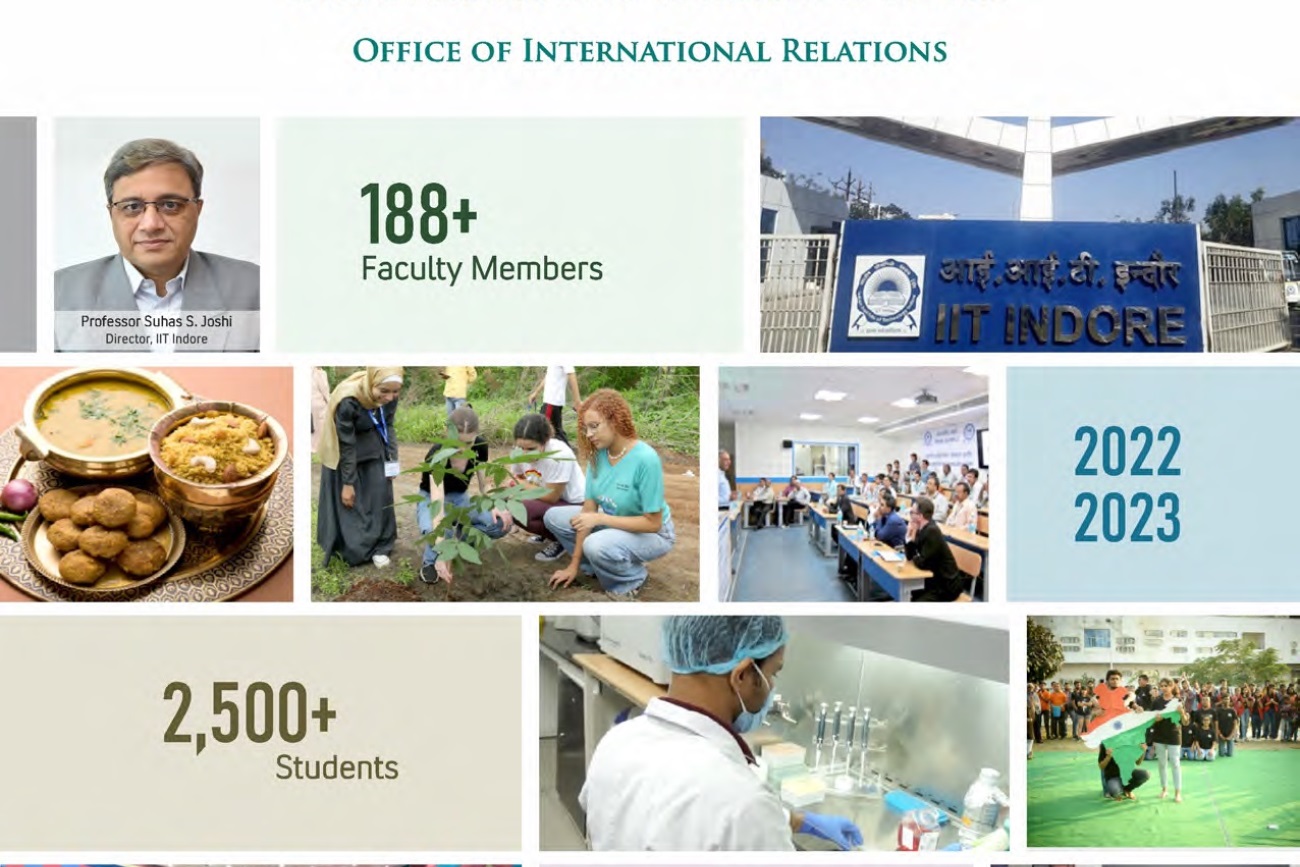
Indian Institute of Technology Indore (IIT Indore), situated in the central part of India in the state of Madhya Pradesh, is an institute of national importance established by the Ministry of Education, Government of India (https://www.iiti.ac.in/_). At present IIT Indore has 11 Departments and 13 Centers of Excellences in Science, Engineering and Humanities offering various UG/PG, Ph.D. programs in diverse fields (https://academic.iiti.ac.in/academic_program.php_. IIT Indore has established state-of-the-art research laboratories, modern lecture halls, on campus accommodation, health center, libraries, Indoor and outdoor sports complex.
Currently, we have 2800+ students and Ph.D. scholars, 200+ highly qualified faculties. IIT Indore has been ranked between 101-150 in Young University Rankings in THE World University Ranking 2023, and 396th QS World University Ranking 2023 with more than 6500 international high impact publications, over 100 technologies and more than 130 patents. We have also established the Advanced Centre for Entrepreneurship (ACE) to foster innovation and entrepreneurship. Moreover, we have signed more than 100 Memorandum of Understanding (MoUs) with various foreign Universities/institutions across the globe.
We are excited to announce that Admissions are now open at IIT Indore for PG and PhD programs for the academic year 2024-25. This provides an excellent opportunity for aspiring international students to pursue higher education in India and broaden their horizons with intercultural programs aimed at offering academic and research exposure.
Students can apply for admission through various programs sponsored by the Ministry of Education, Government of India. These programs include:
- Study In India (SII): The Study in India is a flagship project of the Government of India. The SII program offers scholarships and tuition fee waivers for meritorious students applying to the program. Institutes under the initiative offer from 25% to 100% tuition fee waivers.
Visit the website for more information: https://studyinindia.gov.in/ - Indian Council for Cultural Relations (ICCR): Its objective is to foster and strengthen cultural relations and mutual understanding between India and other countries; to promote cultural exchanges with other countries and people; and to develop relations with nations.
Visit the website for more details: https://studyinindia.gov.in/indian_council_for_cultural_relations_(iccr) and General Announcements for International Students Under ICCR Scholarships: https://iccr.gov.in/announcement - Additionally, students may apply directly under the Self Finance Category. To apply, please send your testimonials and certificates to acaofficer.ir@iiti.ac.in or geeo.ir@iiti.ac.in
Kindly visit the following YouTube page to get more information aboutIIT Indore: https://www.youtube.com/@managerir
General
Mak DARP Project Launch to Revolutionise Management of Academic Records
Published
4 days agoon
April 22, 2024By
Mak Editor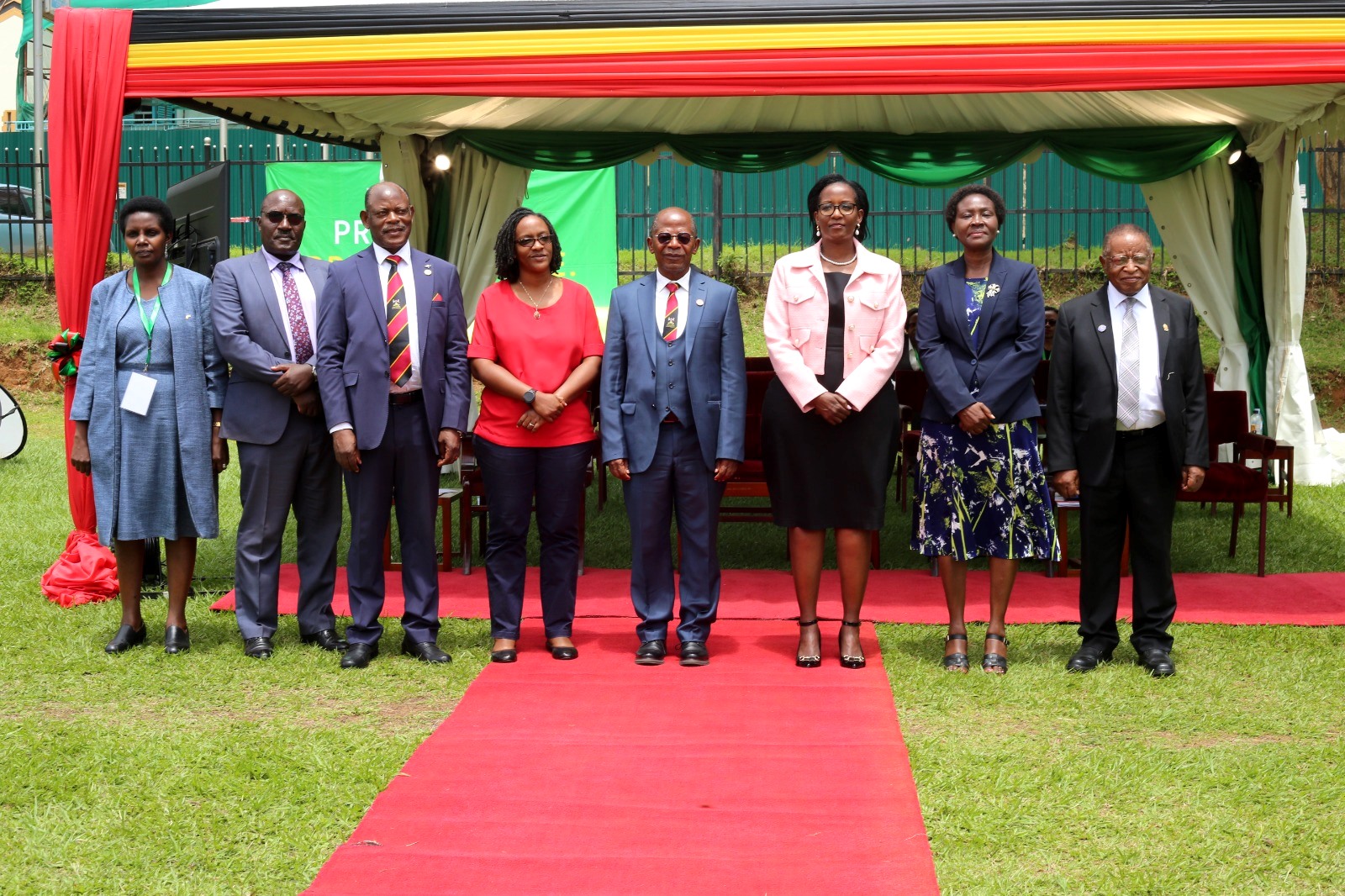
By Ritah Namisango
“This initiative, funded by the Government of Uganda through Makerere University Research and Innovations Fund in partnership with the Mastercard Foundation, represents a significant step forward in our efforts to modernize and digitalize our academic processes. It’s therefore with great pleasure and pride that I launch the Digitalization of Academic Records and Processes project at Makerere University, and I commission the Registry of Students’ Records and the Archive of Students’ Records,” stated the Minister of Education and Sports, Hon. Janet Kataaha Museveni represented by the State Minister for Higher Education, Hon. John C. Muyingo.
As the world continually evolves from manual and traditional methods of records management to modern and digitalized processes, Makerere University launched the Digitalization of Academic Records and Processes (DARP) project to ease the storage, retrieval and acquisition of academic documents by her stakeholders.
The project has digitalized records and implemented new processes as well as established a digital state-of-the-art storage facility at the Senate Building to securely store university academic documents. The digitization process comes along with a university policy that guides on how to record, manage, retrieve and dispose of records not in use. This project is designed to reduce on the substantial amount of space that paper storage systems occupy as well as safeguard records from disasters like fire.
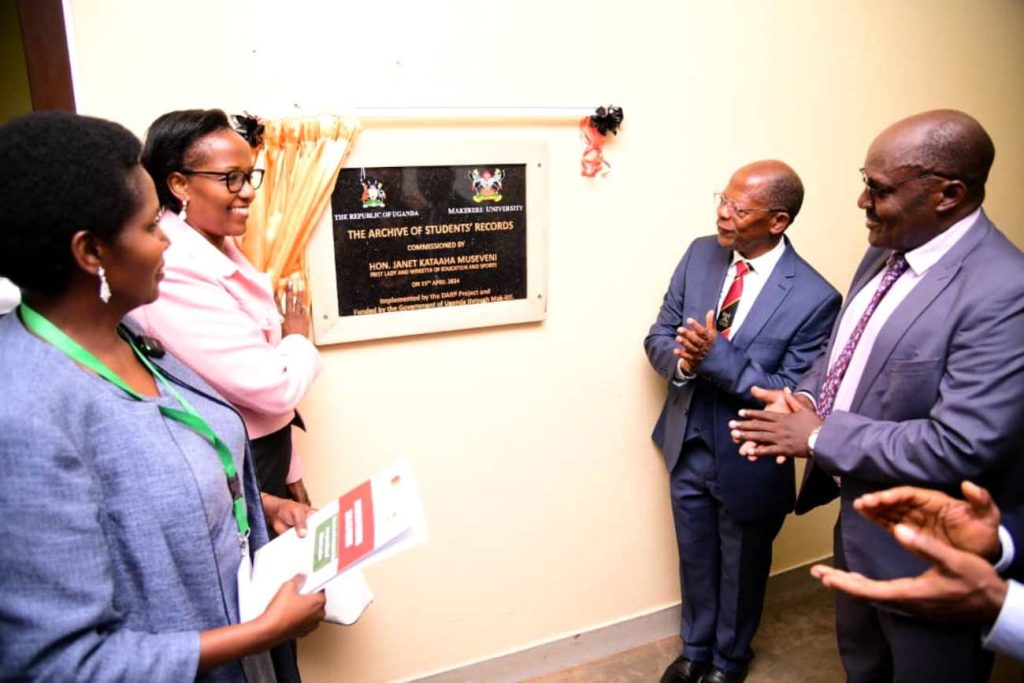
Officiating at the launch of the DARP project on Friday 19th April, 2024 at Makerere University Freedom Square, Hon. John C. Muyingo, affirmed on behalf of Hon. Janet Kataaha Museveni that the launch was a significant milestone in the history of Makerere University.
The Education and Sports Minister further noted that in today’s fast-paced world, universities must manage massive amounts of academic information, and efficient record keeping necessitates that the information is accurate, accessible and secure, benefiting both the institution and its stakeholders. She noted that the DARP system would streamline the processes of managing and accessing academic records, resulting in significant timesaving for students and other stakeholders at the university and beyond.
“Digitalization of academic records and processes is an innovation set to revolutionize the way records are managed by addressing pressing public concerns such as efficiency, security, integrity and accessibility as well as eliminating the unnecessary delays in the processes. The traditional manual approach, while effective in its time has become increasingly challenging to sustain in this digital world, therefore, digitalizing academic records and processes provide crucial responses to the monotonous questions that the outdated manual system never addressed,” stated the Minister’s speech.
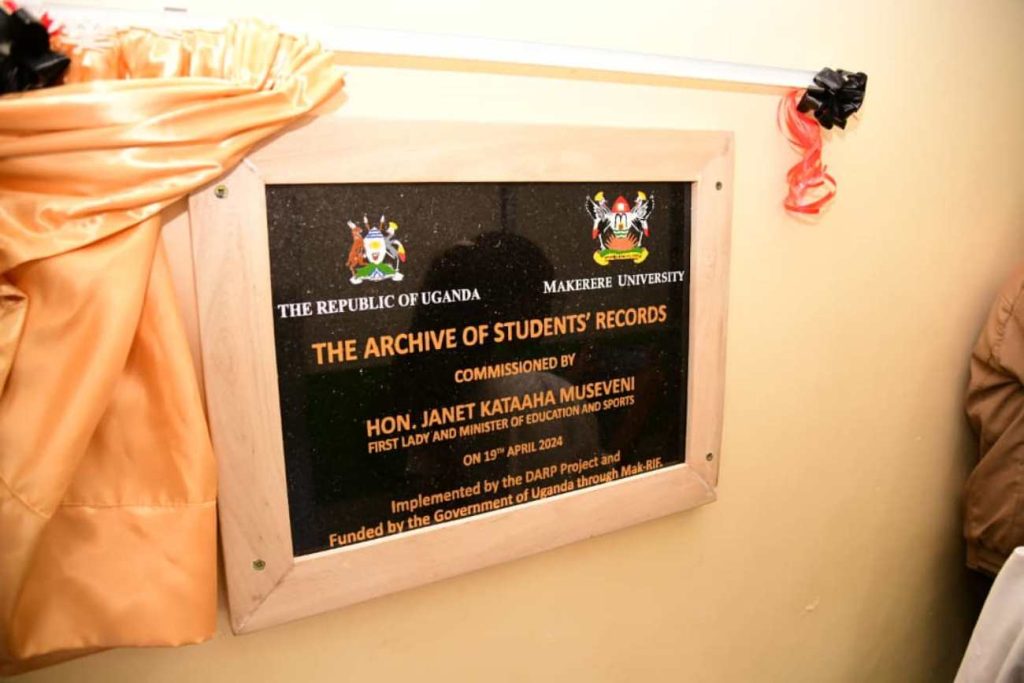
Having outlined the challenges and risks that the traditional paper-based record keeping systems present such as the storage space factor, the risk of mixing active and inactive records, the high rate of wear and tear as well as vulnerability to manipulation of records, the Minister commended Makerere University on the enviable track record of efficiently managing and securely storing its academic documents, Senate minutes, curricula, examination results and students files for nearly a century, despite political upheavals and other challenges.
She observed that digitalized systems would make academic records more accessible to the students and eliminate the frustration of delays caused by bureaucratic inefficiencies and the outdated paper system, enabling them to timely take the necessary steps in academic and professional progression.
As the University embarked on its journey of digital transformation, Hon. Janet Kataaha Museveni equally applauded Makerere for continuously upholding its commitment to academic excellence, research and innovation. She advised the fraternity to stay committed to the principles of innovation and inclusiveness that define the University. As such, she urged them to embrace the digital transformation wholeheartedly so as to harness the power of technology and enable Makerere University to remain a beacon of excellence in the academic world.
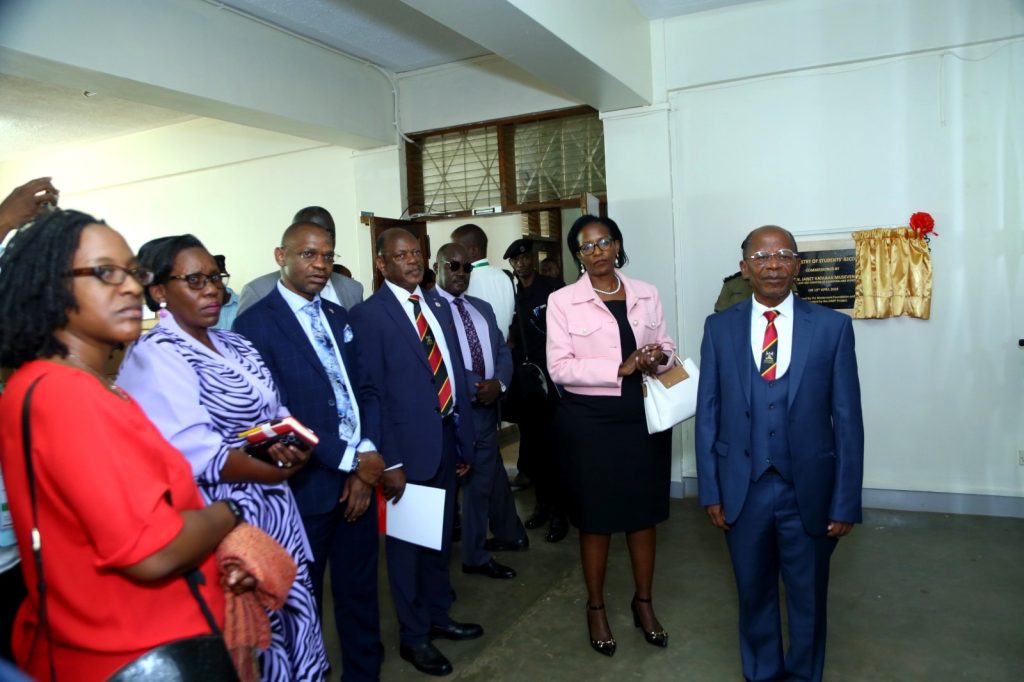
“Since its establishment in 1922, Makerere University has been a beacon of knowledge and learning, shaping the minds of generations of students and contributing significantly to the development of our nation, Africa and the world at large. Thank you for these brains. Your hard work, expertise, and dedication were instrumental in building this DARP project to realization. I am confident that you will have a lasting and positive impact on this university and the entire education sector, not only in Uganda, but the entire world,” said Hon. Janet Museveni.
The First Lady expressed her gratitude for the partnership with Mastercard Foundation and the support it renders in advancing education and innovation at Makerere University.
The Vice Chancellor, Prof. Barnabas Nawangwe highlighted that the launch of the DARP project was not only a landmark achievement for Makerere University, but also a confirmation of the importance that the University Council and Management attach to the role that digitalization and e-services play in implementation of the University strategic plan that continually strives for a professionally managed university.
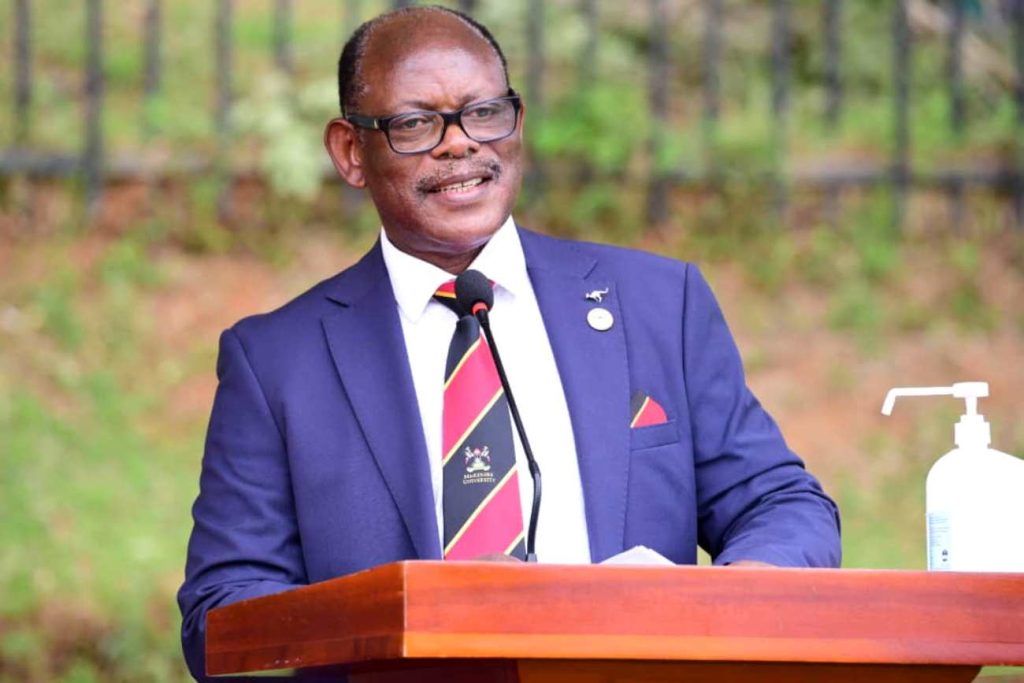
The Vice Chancellor revealed that the official launch of the DARP Project, undertaken in-house by a hardworking team of University staff, was a financial gain on the part of the University and an additional asset in the quest to improve efficiency and effectiveness as far as the University academic records and processes are concerned.
“Our current drive has been the continued digitalization of various business processes and services so as to be more responsive to the dynamic needs of our students, staff and stakeholders. We have been able to achieve this through intentional development of our in-house information systems development capacity, which has saved us a lot of funds in terms of initial purchase as well as annual license renewal costs,” said the Vice Chancellor.
Prof. Nawangwe stated that the DARP project has greatly contributed to the timely and improved service delivery to students and clients. He added that the ultimate goal is to enable students download their own transcripts without need for elaborate physical processes at the university.
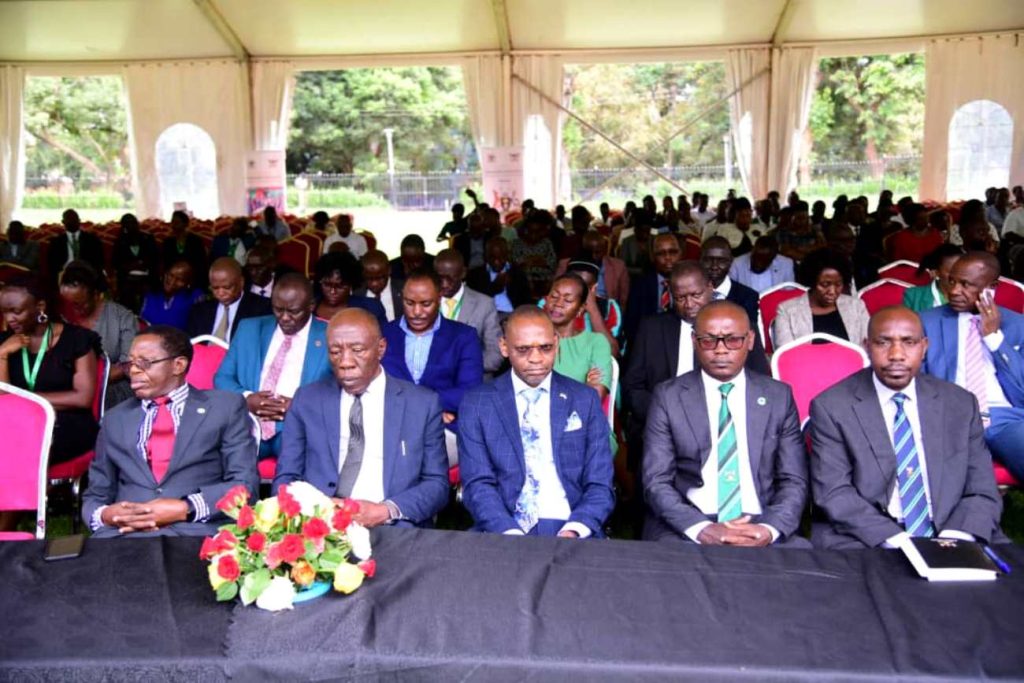
“During the 74th graduation ceremony, Makerere University was able to issue academic transcripts to qualifying students before graduation. I am pleased to inform you that we succeeded in issuing of academic transcripts before the graduation date because of the DARP project, which we are launching today. With the digitalization of students’ academic records, the University is now in a better position to provide the required information and data on time,” said the Vice Chancellor.
Prof. Nawangwe elaborated that Makerere, being Uganda’s Premier University has been a major beneficiary of several initiatives aimed at improving ICT infrastructure and connectivity. He added that the University has been able to achieve this largely due to the generous donations of the Government of Uganda and other development partners. He thanked His Excellency Yoweri Kaguta Museveni, the President of Uganda whose support led to the creation of the Research and Innovations Fund (Mak-RIF) in the 2019/2020 financial year with initial funding of UGX 30 Billion.
He revealed that the funding has continued to be availed throughout the last five financial years, which is clear demonstration that the Government of Uganda esteems Research and Innovation as catalysts to Uganda’s continued march from a peasant to a modern and prosperous country.
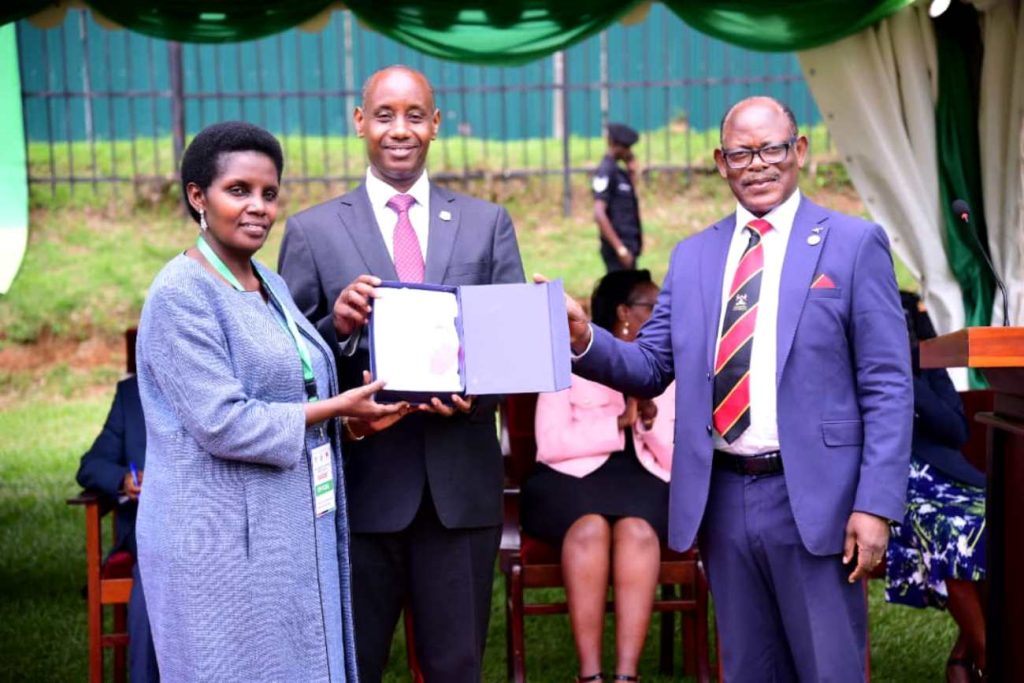
“I am proud to say that Mak-RIF has transformed Makerere’s academic and research landscape tremendously. Over the last five Financial Years, we have worked with other key stakeholders including Government ministries, institutions, agencies, organizations, and the private sector. Together, we have continued to increase the local generation of translatable research and scalable innovations that address key gaps required to drive Uganda’s development agenda, especially the un-funded priorities” stated Prof. Nawangwe.
In the same spirit, the Vice Chancellor applauded the Principal Investigator and Team Leader DARP, Mrs. Patience Rubabinda Mushengyezi and all the Team Members for the hard work that has improved the status of academic records and processes from manual processes to e-services. The DARP project is a collaboration between the Academic Registrar’s Department, College of Education and Externals Studies (CEES), College of Computing and Information Sciences (CoCIS) and the Directorate of Information and Communication Technology Support (DICTS). The DARP Project team includes: Prof. Betty Ezati, Dr. Peace Tumuheki, Dr. David Luyombya, Dr. Joyce Bukirwa, Ms. Ruth Iteu Eyoku, Mr. Juma Katongole, Mr. Joshua Muhumuza and Mr. Lubowa Gyaviira.
The Vice Chancellor also thanked the Makerere University Research and Innovations Fund (Mak-RIF) and the Mastercard Foundation for supporting different phases of the DARP Project.
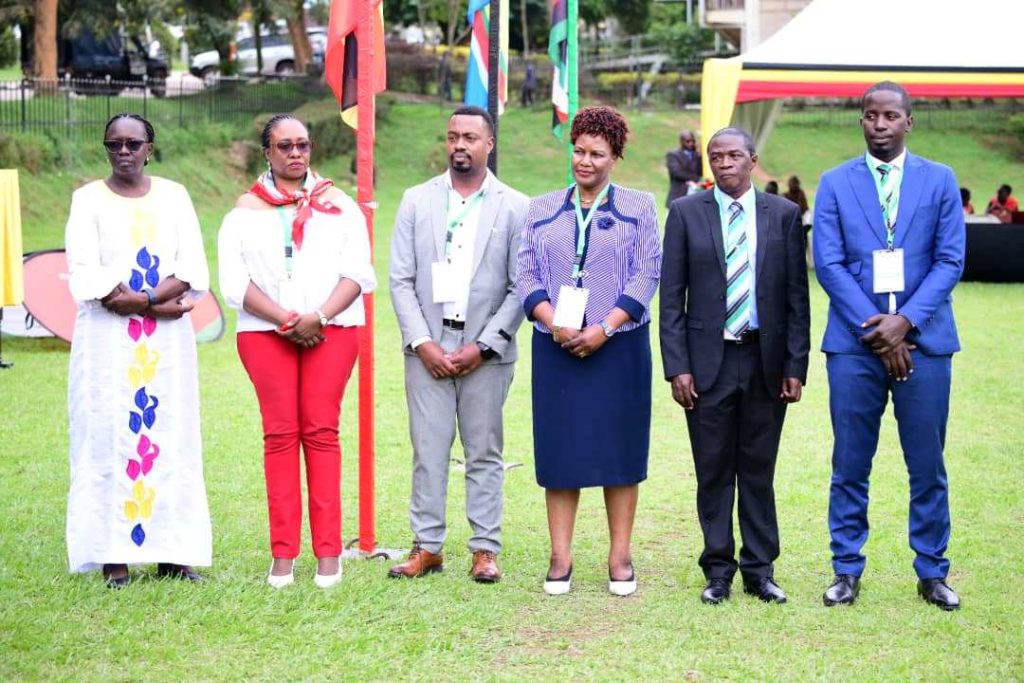
Mrs. Lorna Magara, the Chairperson of Makerere University Council acknowledged that launching the DARP project at Makerere University marked a significant step forward in digitalizing higher education services. She underscored that the transformational power of digitalization could not be overstated. She stated that by implementing an Academic Records Management System, the University would streamline the tracking and retrieval of academic files and establish a robust platform for digital certification and record verification.
“In an era where credential fraud poses a significant challenge, the DARP Project reinforces transparency, trust, and confidence in our academic processes. It is testament to our commitment to excellence. The DARP Project heralds a new era; one where our certificates and transcripts are shielded against increasingly sophisticated forgeries. By providing digitally verifiable academic documents, we empower employers worldwide to expedite verification procedures,” she articulated.
The Chairperson stated that Makerere University aims to create a dynamic and integrated learning environment with a goal to equip students with the skills and knowledge needed to thrive in an ever-evolving world. She emphasized the need to prioritize student-centeredness and adaptability which vision perfectly aligns with the DARP Project to ensure that the most deserving students can compete fairly in the job market alongside genuinely qualified candidates.
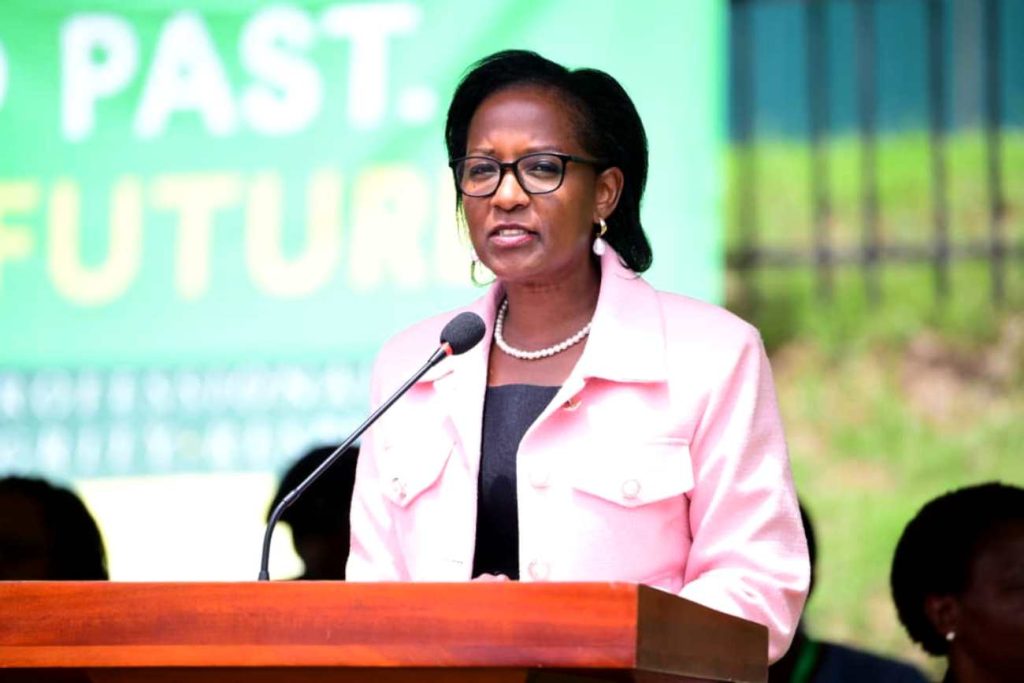
She advised that a system’s effectiveness hinges on the quality of input it receives, therefore, meticulous attention to detail is essential to ensure that the necessary information is accurately fed into the system to yield the expected outcomes. She recommended that vigilant effort has to be invested in ensuring quality processes in how the information is gathered and fed into the system, and the quality of persons tasked to do the work.
Mrs. Magara praised the DARP Principal Investigator for initiating the project in support of the University’s efforts to; address the critical element of maintaining integrity of academic records, significantly contributing to the University’s commitment to digitizing systems, and upgrading the process of archiving of records for ease in verification, certification, and retrieval.
She also extended appreciation to the Government of Uganda for the provision of funds through Mak-RIF, and to Mastercard Foundation for the provision of equipment and other support that will facilitate safe processing and storage of the academic documents.
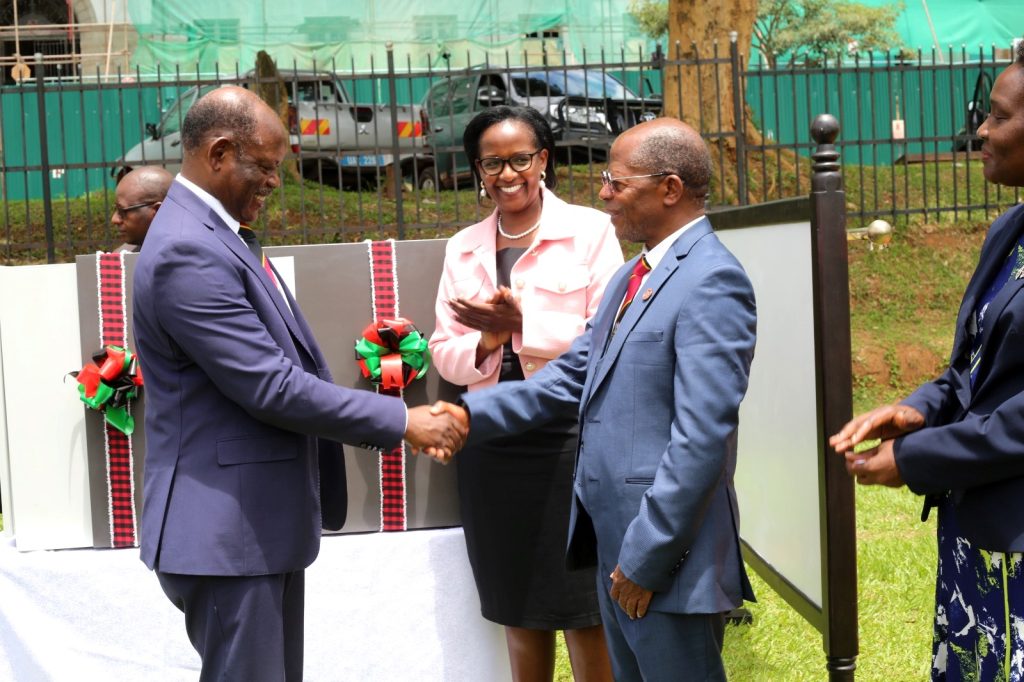
The Principal Investigator and Team Leader, DARP project, Mrs. Patience Rubabinda Mushengyezi proclaimed that the launch of the project was the birth of a new era in records management at Makerere University.
To enable the audience to understand and appreciate the situation before the DARP project, Mrs. Mushengyezi shared a documentary that highlighted the transformation from a purely manual process to a digital one. She added that the digitalization of student records from the 1980s changes the narrative of delays and long queues to fast, timely and friendly services to the students.
The Principal investigator disclosed that the DARP project team’s aspiration was to have the digitalization of students’ records rolled out in all the schools and colleges of the University. She observed that because of the hard work of the DARP team, they now have clear and well organized documents and the ‘ugly’ records shall never be seen again since they no longer exist. She expressed gladness that what started as a vision had become reality, culminating in the launch of the DARP project.
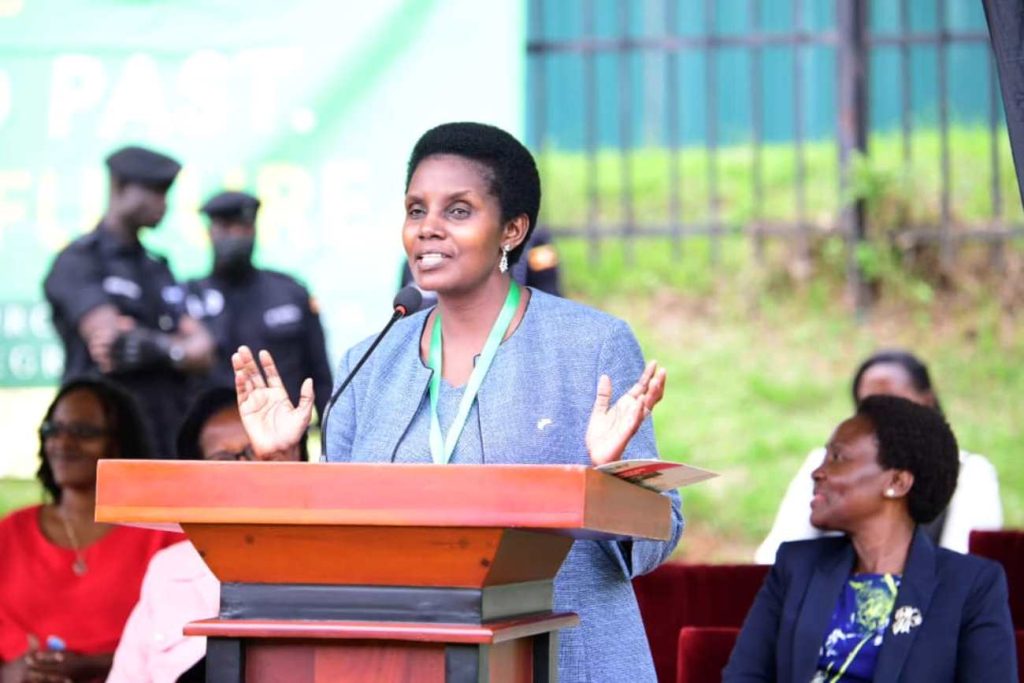
“Today, Makerere University is launching a new era of digital transformation in the management of students’ records and service delivery. We are changing the narrative of long queues, lengthy processes and we are now moving to efficient and digital services. We are here also to commission the registry of the students’ records and archive. The registry has been fitted with modern shelves with the capacity of storing over 30,000 students files but as we have seen, there is room for improvement and expansion. The archive has been fitted with modern shelves that have a capacity of storing over 100,000 students’ files and 21 wagons will store 170,000 students’ files,” Mrs. Mushengyezi declared.
Recalling the genesis of the DARP Project, Mrs. Mushengyezi shared that when the Government allocated support to the university’s research and innovations fund in 2019, she approached her colleagues and together, they submitted a project proposal. The project identified several challenges which were affecting records management at Makerere University namely; manual records handling, inadequate storage space, inadequate security for records, inexistent policy on records management, and lack of a system to streamline records management. The DARP project therefore set out to address these gaps with the ultimate goal of operating e-services.
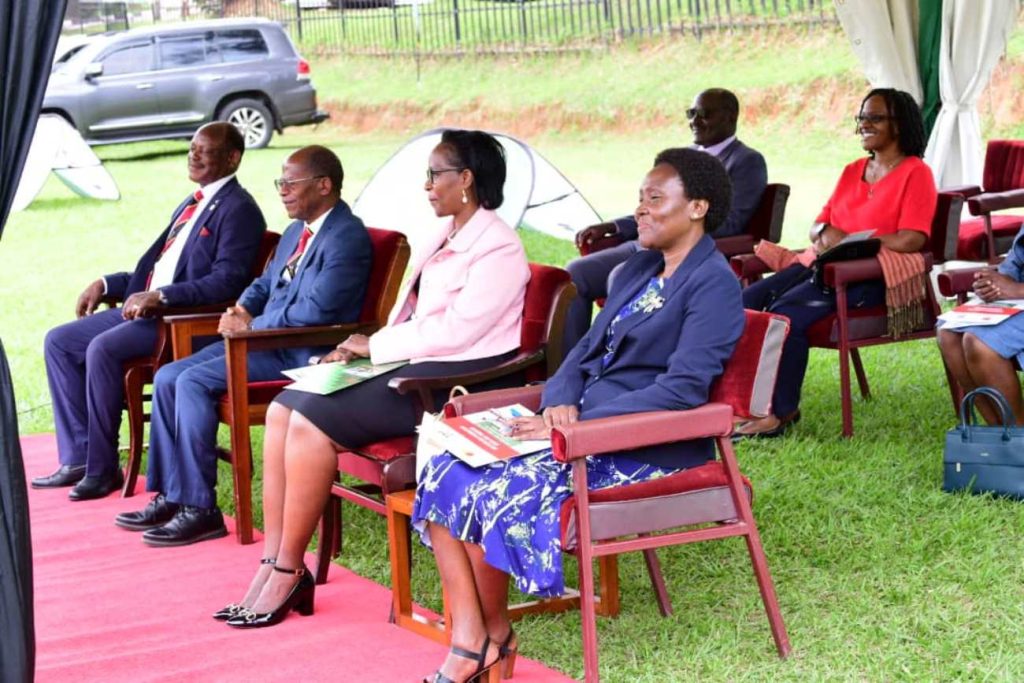
“The objectives of DARP Project were to digitalize academic processes including students’ files and examination results and other documents like senate minutes. We wished to establish a students’ records verification and certification Centre. We also wanted to use ICT to improve efficiency in conducting senate meetings and to archive existing manual documents into properly bound and referenced files. It has been a lot of hard work by the project team, but we have seen God’s hand in this transformational journey. I wish to say that we have achieved 95% of our objectives,” Mrs. Mushengyezi stated.
The Principal Investigator noted that the DARP project had created efficiency in the academic Registrar’s department with ability to generate reports on number of students by categories such as course, graduation cohort, academic disciplines i.e. Medicine, Law, Engineering etc., current enrolment and progression, as well as policies passed by the University Senate per year, and so on.
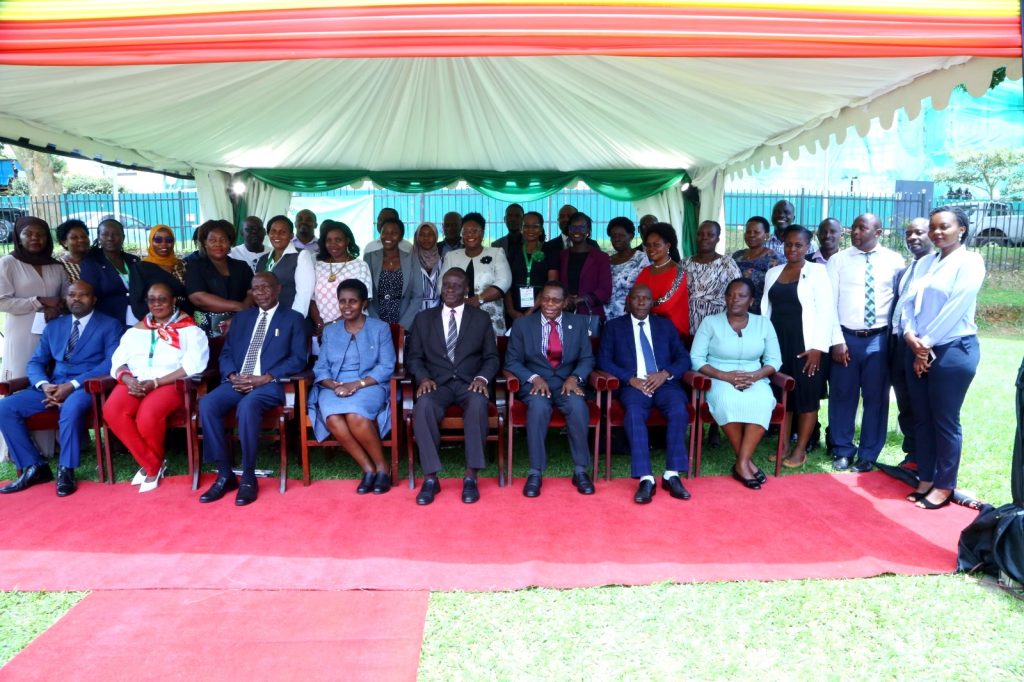
She thanked the Government of Uganda for funding the entire process by providing laptops, access control systems, CCTV cameras, printers, furniture, archival boxes, the 21 shelves, the wagons, stationery and facilitation of the entire team. She also thanked Mastercard Foundation for the support through the relief fund.
She appreciated the entire Makerere University Council and Management for the support rendered towards the establishment of the DARP project and for prioritizing the Project as a university programme. In a very special way, she acknowledged Prof. William Bazeyo, the former Deputy Vice Chancellor (Finance and Administration), Prof. Fred Masagazi Masaazi-Chairperson of Mak-RIF Grants Management Committee (GMC), Prof. Umar Kakumba, Deputy Vice Chancellor (Academic Affairs), Mr. Alfred Masikye Namoah, former Academic Registrar and the Academic Registrar, Prof. Buyinza Mukadasi, the University Secretary, Mr. Yusuf Kiranda, Deputy Registrars namely Mr. Charles Ssentongo and Mr. Tom Otim, for providing tireless support.
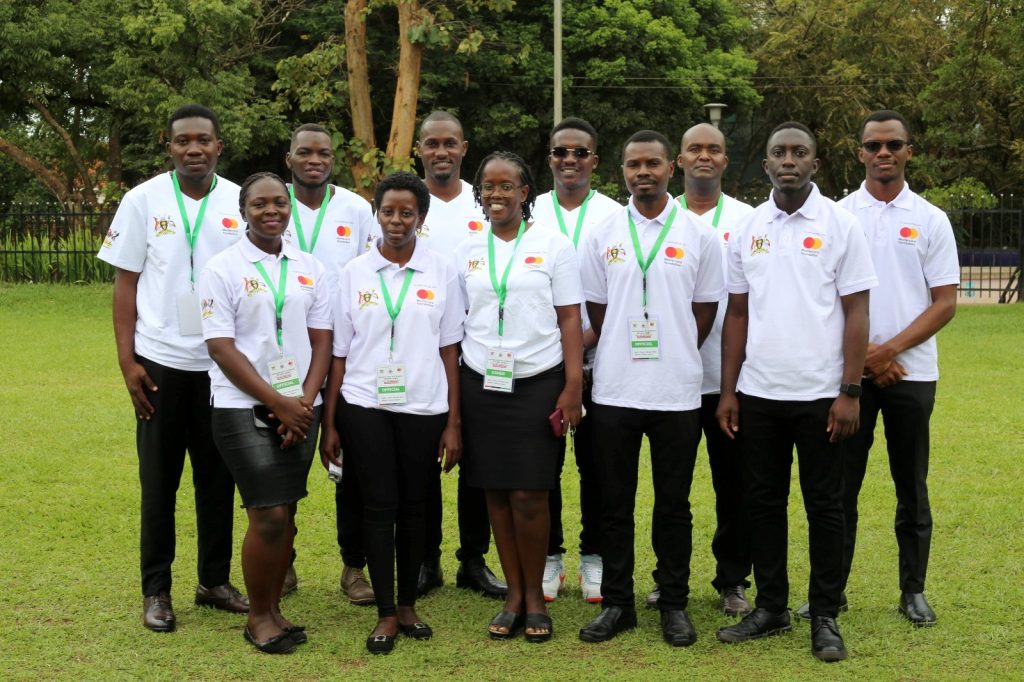
In addition, she recognized the supervisors in the Directorate of Research and Graduate namely Prof. Edward Bbaale and Ms. Prossie Nakayiki.
The Principal Investigator, Mrs. Mushengyezi also appreciated the members of staff whom she referred to as DARP Foot Soldiers for organizing, sorting and scanning the records.
In recognition of her selfless service and leadership, the DARP project team members through the Vice Chancellor, Prof. Barnabas Nawangwe presented Mrs. Patience Mushengyezi with a plaque and bouquet of flowers.
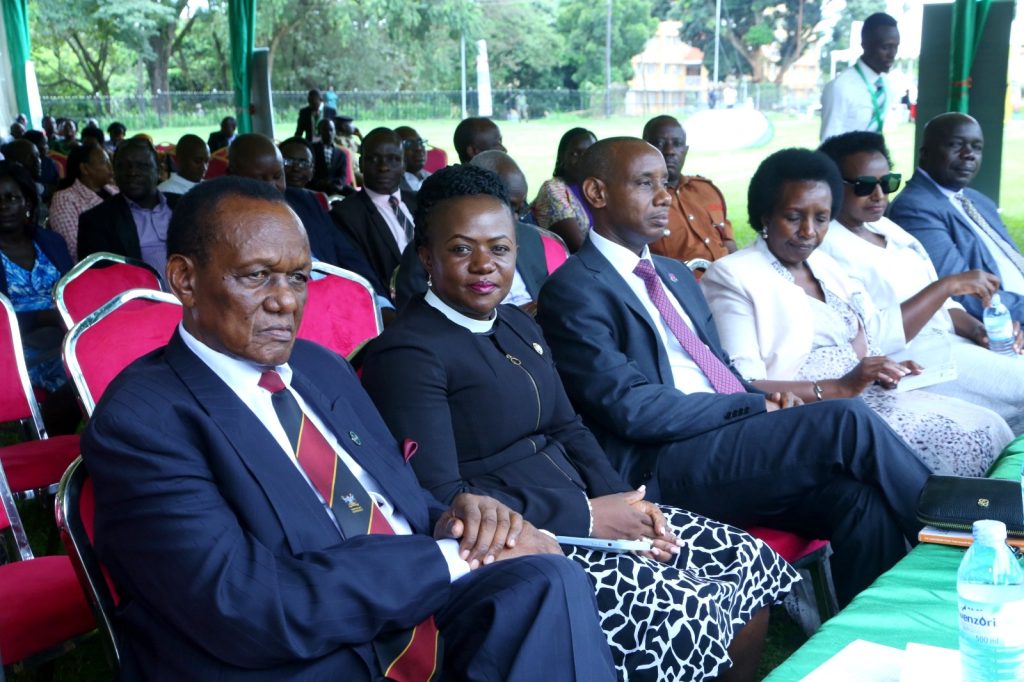
The DARP project launch was graced by the Chancellor Emeritus, Prof. Ezra Suruma, Members of Parliament, Vice Chancellors of other Universities, former Vice Chancellors, former Deputy Vice Chancellors in charge of Finance and Administration, the Makerere University Students’ Guild, and Mrs. Mushengyezi’s family. The Chaplain, St. Francis Chapel, Rev. Dr. Lydia Nsaale Kitayimbwa led the opening prayer while the event was moderated by Dr. Zahara Nampewo, the Deputy Principal of the School of Law and Ms. Ritah Namisango, Principal Public Relations Officer and Chairperson of the Protocol, Publicity and Media Sub-Committee for the launch. The Department of Performing Arts and Film was on hand to lead the anthems and keep the guests entertained.
General
Mak holds Mental Health Awareness Campaign for International Students
Published
4 days agoon
April 22, 2024By
Mak Editor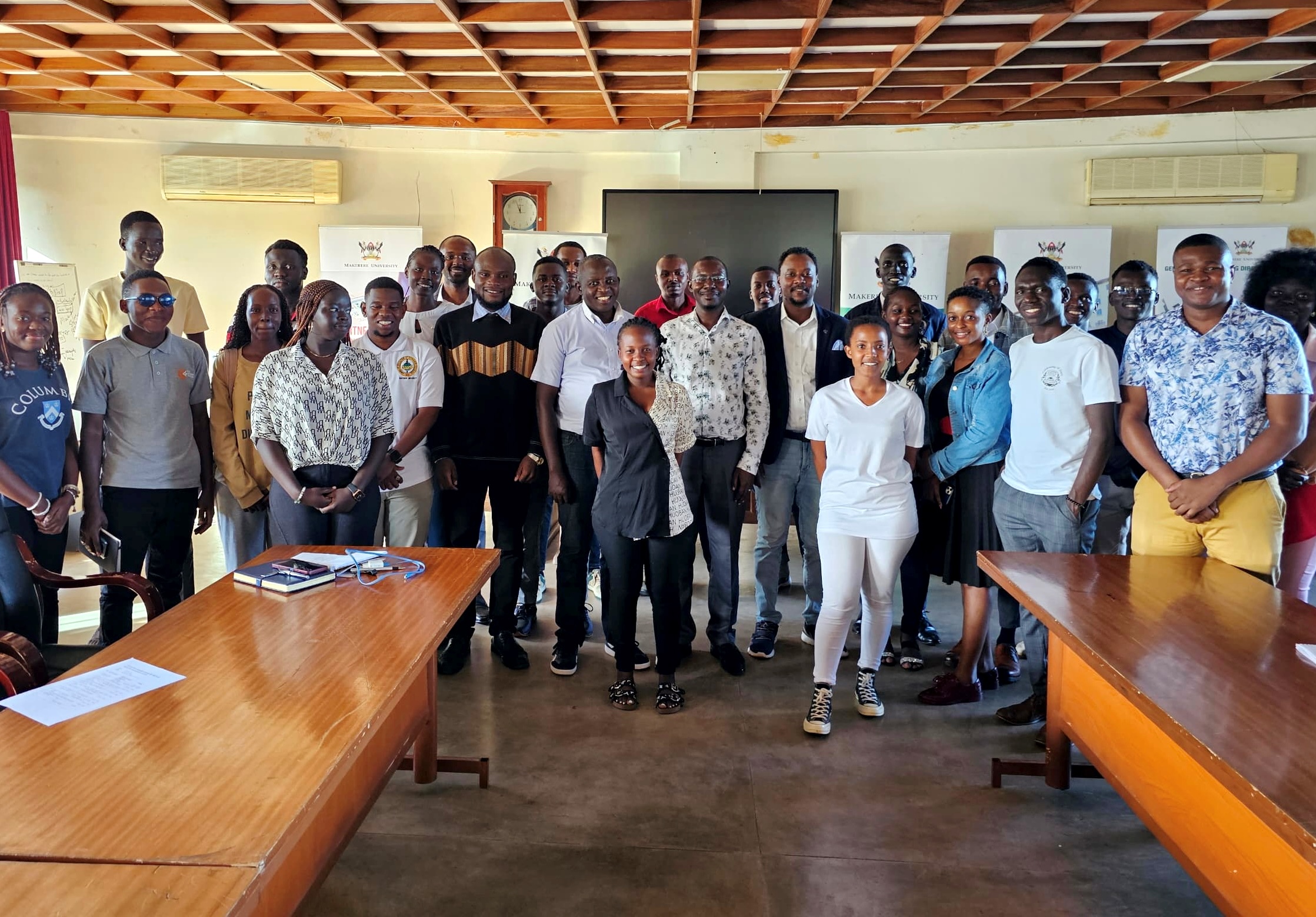
By Betty Nabisubi
On Friday 12th April 2024, over 100 international students convened at Makerere University to participate in the Mental Health Awareness Campaign organized by the International Students Union in partnership with the Counselling and Guidance Centre, International Office and Office of the Dean of Students.
The campaign, which included both physical and virtual participants, rallied international students to always ask for help. The annual event enables students to participate in engaging discussions, and provides a platform for them to openly share and address personal and academic challenges, both on and off campus.
The aim of holding a mental health awareness campaign for international students in the university is to promote mental well-being and provide support and resources for students facing mental health challenges. Furthermore, it seeks to raise awareness about common mental health issues, reduce stigma surrounding mental illness, and educate students on available mental health services and support networks. Additionally, it aims to empower students to recognize signs of distress, encourage help-seeking behavior, and foster a supportive and inclusive campus community where students feel comfortable discussing mental health concerns.
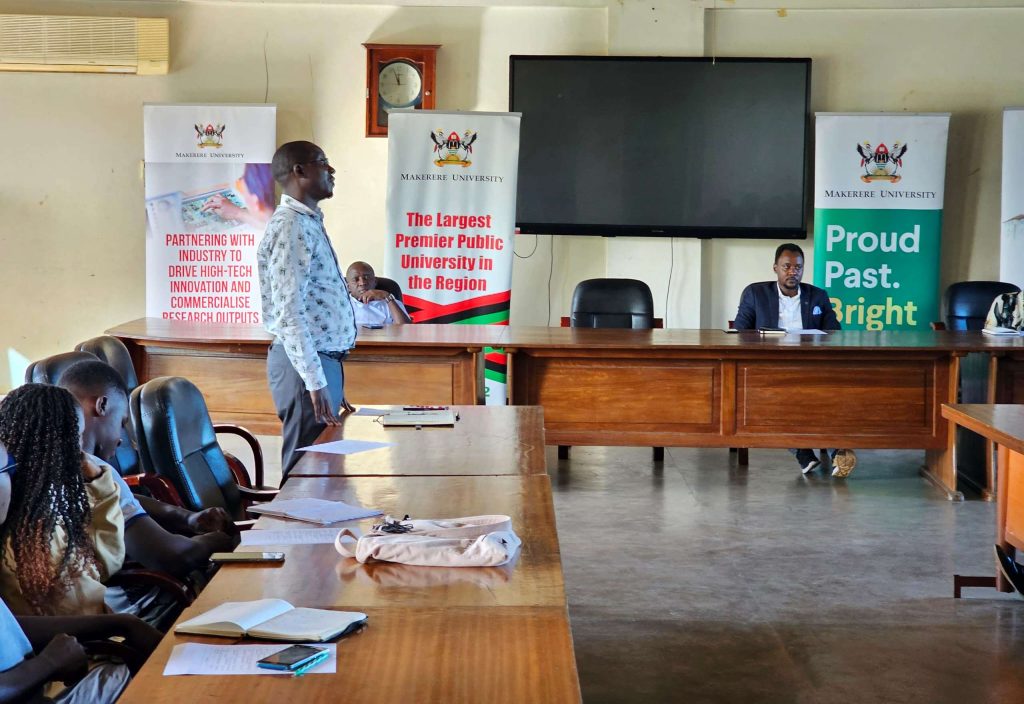
In line with the Mental Health Awareness Campaign theme; It is ok to ask for help, each Official urged the international students to seek guidance and support from the right offices and entities within the Makerere University system.
The Office of the Dean of Students represented by Mr. Peter Mwanja, Warden of University Hall emphasized the importance of students seeking help rather than isolating themselves in their hostels when faced with problems. He urged students to refrain from complaining about lack of assistance, but instead take action by speaking up when faced with challenges. Mr. Mwanja pledged to stand with the students throughout their academic journey so as to ensure that they have a fruitful stay at Makerere University.
In the same spirit, the Manager of the Makerere University Counselling and Guidance Centre, Mr. Henry Nsubuga called upon international students to utilize their services. He appealed to students to seek for help whenever they feel distressed.
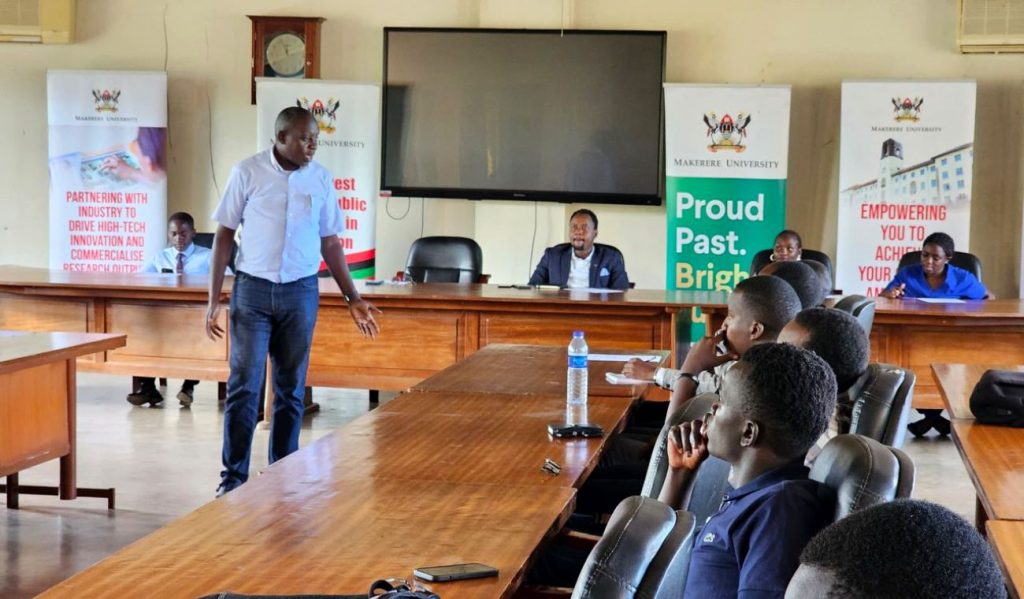
“Please come to the Centre when you need help. The Centre is ready to provide assistance upon any distress signal. I assure you that nobody will judge you for not being okay. We have professional counsellors who are willing to help,” remarked Mr. Nsubuga. The Makerere University Counselling and Guidance Centre is conveniently located at Plot 106, Mary Stuart Road, opposite Mary Stuart Hall.
Dr. Gardner Herbert from the Julius Nyerere Leadership Centre at Makerere University emphasized the importance of emotional intelligence, which encompasses the ability to understand, manage, and express one’s own emotions effectively, as well as to recognize and respond appropriately to the emotions of others. He highlighted the significance of students possessing skills such as self-awareness, self-regulation, social awareness, and relationship management.
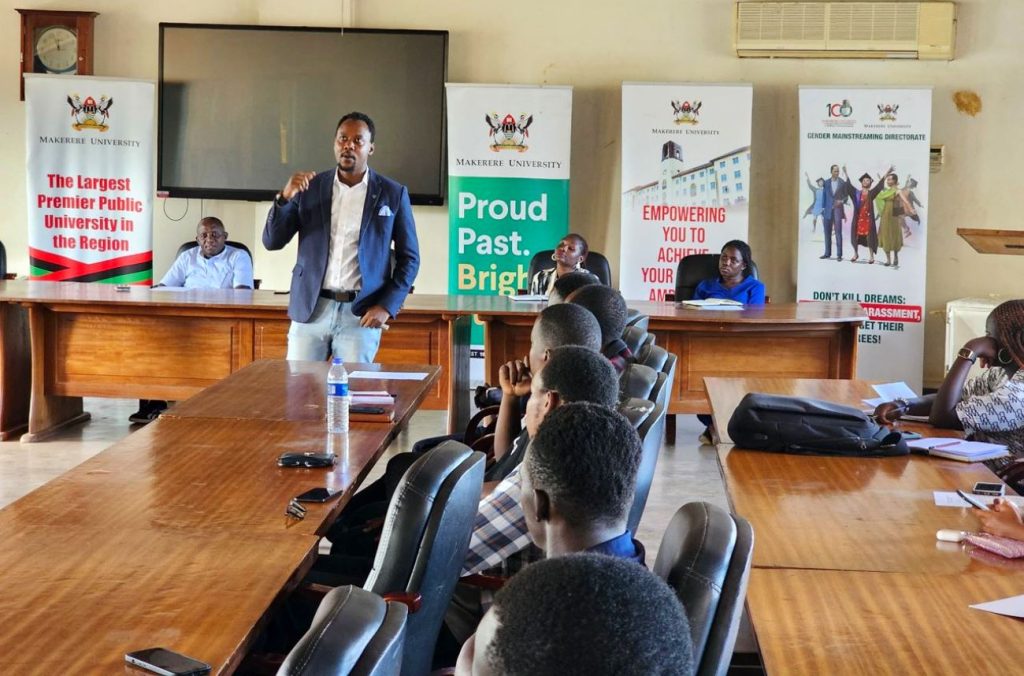
Self-awareness, he emphasized, serves as the foundation of emotional intelligence. This involves recognizing and understanding one’s own emotions, strengths, weaknesses, values, and motivations. Dr. Gardner explained that ndividuals with high self-awareness are better equipped to comprehend how their emotions influence their thoughts and behaviors, leading to more informed decision-making and greater self-control.
Mr. Gerald Ochwo on behalf of the Makerere University International Office encouraged the audience to visit the premises on Flat A5, Block A, Lincoln Flats for their mandate is anchored on ensuring that International students’ university experience is enriching. Furthermore, he emphasised the importance of students managing their visas proactively, instead of rushing to renew them either at the last minute or upon expiry. He pledged to organize more events to foster relationships among students.
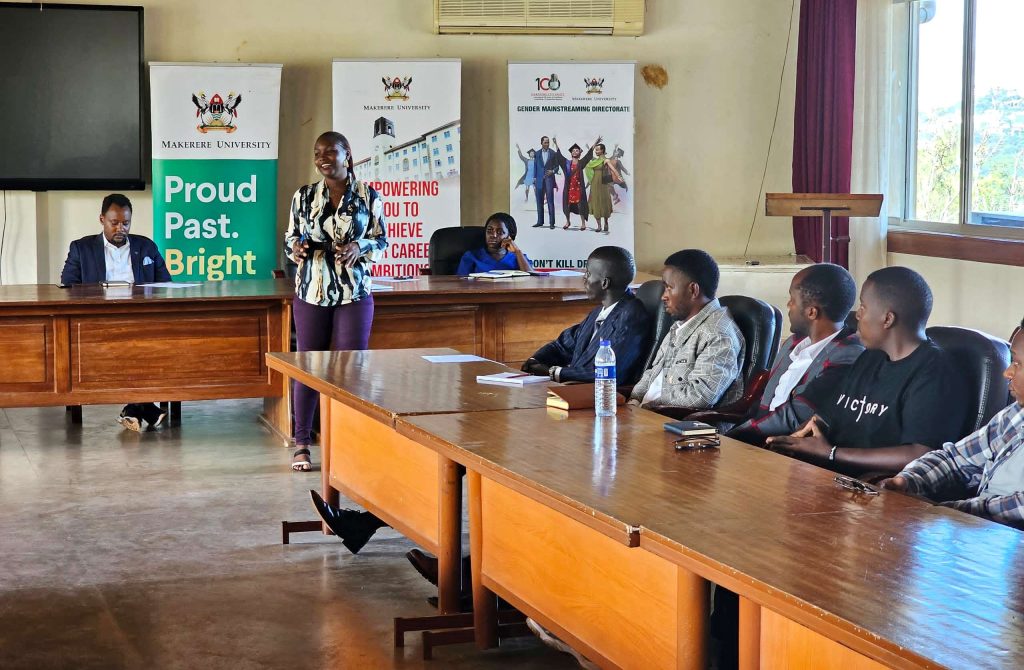
Focusing on nurturing a supportive environment for students away from home, the International Office invited Ms. Olivia Mwanje, a student of Makerere University pursuing a Master’s degree in Climate Change and Development at the College of Agricultural and Environmental Sciences to share a lived experience.
Ms. Mwanje was one of the beneficiaries of the exchange students’ programme to Utrecht University in the Netherlands. Her testimony served to demonstrate to international students that with dedication and sacrifice, it is possible to leave one’s home country, study abroad, and excel both academically and personally. She encouraged students to remain focused on their academic programmes despite the allure of other pursuits.
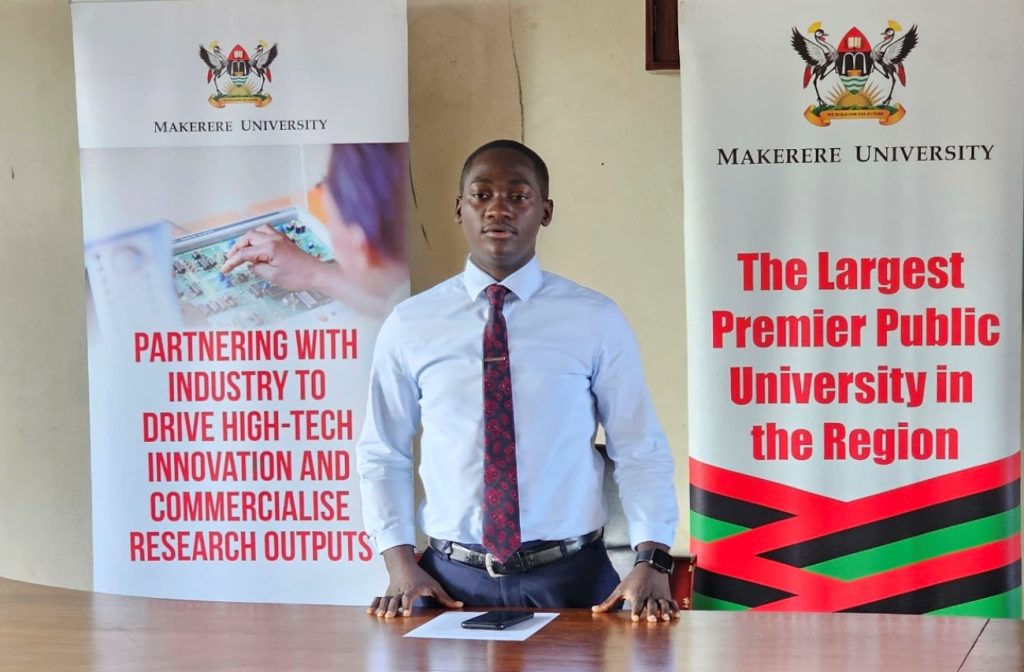
“I urge you, fellow students, to remain steadfast in your educational aspirations while exploring the opportunities available. Prioritize your academic goals over non-academic pursuits,” said Ms. Mwanje. She stressed that deviating from the primary objective leads to unintended consequences. For instance, she shared stories of students who abandoned their academic pursuits for menial jobs upon arrival abroad. Ms. Mwanje advised students to stay committed to their studies and, upon completion, pursue other non-academic endeavors if they so desire.
The Guild President, H.E. Vincent Lubega Nsamba expressed the Guild Leadership’s strong commitment to ensuring that international students have a comfortable stay at Makerere University. He encouraged international students to seek counselling whenever they feel distressed and emphasized the importance of talking to peers for support.
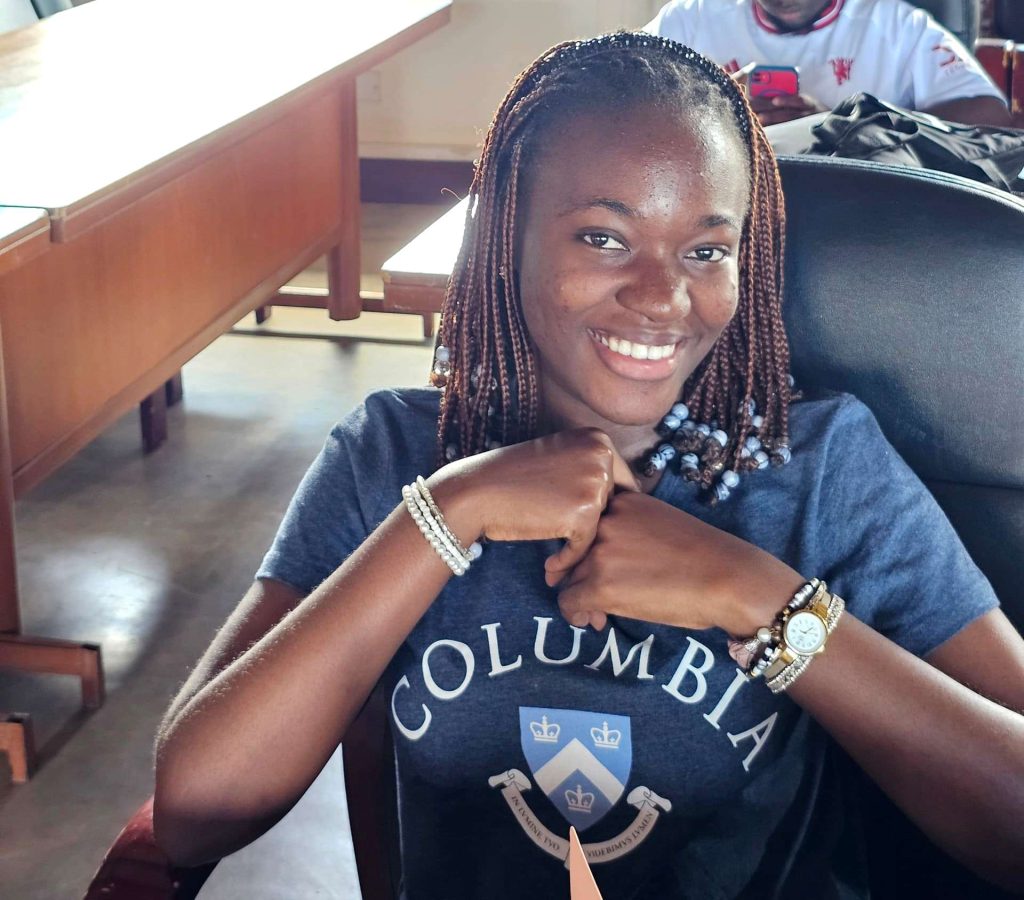
One of the international student leaders, Mr. Harrison Igwe expressed enthusiasm for organizing activities that promote unity within the international student community at Makerere University. The goal of the activities, he said, is to enhance camaraderie and strengthen support networks among international students.
Trending
-
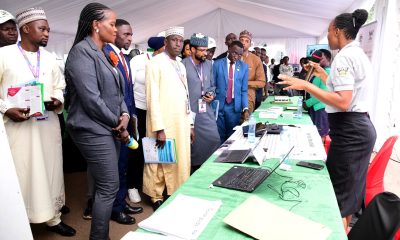
 Computing & IS1 week ago
Computing & IS1 week agoFree Course: Introduction to Data Science
-
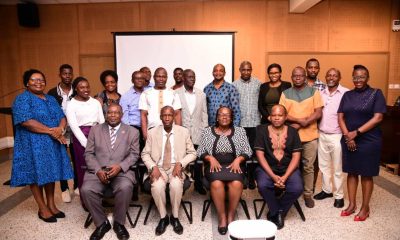
 Education1 week ago
Education1 week agoGovernment Asked to Make Fine Art Compulsory in Secondary Schools
-
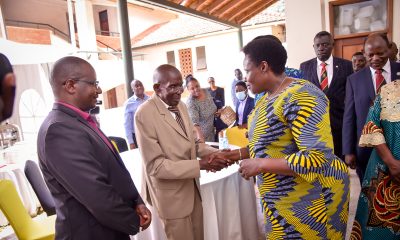
 General1 week ago
General1 week agoProf. Justin Epelu-Opio, Our Longest Serving DVC Rests
-
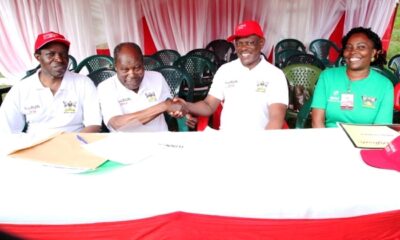
 General1 week ago
General1 week agoDr. Martin Aliker – Celebrating A Life Well Lived
-
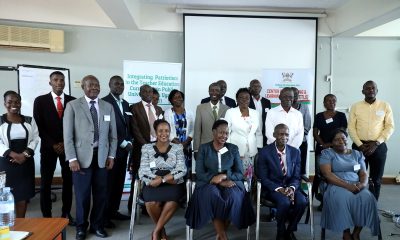
 Education1 week ago
Education1 week agoScholars call for incorporating patriotism in education curriculum
